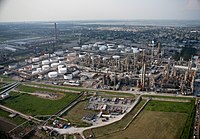
Photo from wikipedia
Abstract New antibacterial PET surfaces were developed from vanillin-derived biobased monomer. An easy one-step and high yielding synthesis of N-(4-hydroxy-3-methoxybenzyl)-acrylamide monomer was successfully achieved. PET was modified by a two-step… Click to show full abstract
Abstract New antibacterial PET surfaces were developed from vanillin-derived biobased monomer. An easy one-step and high yielding synthesis of N-(4-hydroxy-3-methoxybenzyl)-acrylamide monomer was successfully achieved. PET was modified by a two-step procedure: Type II photoinitiator was first grafted through a PET aminolysis with N,N-diethylethylenediamine, then the photopolymerization of the biobased acrylamide monomer was performed according to a “grafting from” technique. PET surface modifications were characterized by XPS and UV–visible spectroscopies, as well as water contact angle measurements. Finally, antiadhesion biotests were conducted to evaluate the potential antibacterial performances of the modified surfaces against gram-positive (Rhodococcus wratislaviensis and Staphylococcus aureus) and gram-negative (Escherichia coli and Pseudomonas aeruginosa) strains.
Journal Title: European Polymer Journal
Year Published: 2018
Link to full text (if available)
Share on Social Media: Sign Up to like & get
recommendations!